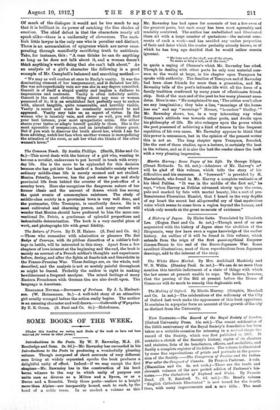SOME BOOKS OF THE WEEK.
Milder this heading we seise such Books qf tke weak es Aare eat bun sturrs4 for sestina is °thin. fariatO
Introductions to the Poets. By W. F. Rawnsley, M.A. (G. Routledge and Sons. 2s. 6d..)—Mr. Rawnsley has succeeded in his Introductions to the Poets in producing a wonderfully pleasing volume. Though composed of short accounts of very different men living at widely separated epochs the book produces a delightful unity of effect. Indeed—if we may except the first chapters—Mr. Rawnsley has in the construction of his book borne witness to the way in which unity of purpose can unite men as diverse as a Milton and a Byron, or as a Burns and a Rossetti. Truly these poets—scalers to a height more than Alpine—are inseparably bound, each to each, by the bond of a noble verse. In so modest a volume as this
Mr. Rawnsley has had space for accounts of but a few even of the greatest poets, but each essay has been most agreeably and readably contrived. The author has embellished and illustrated. them all with a large number of quotations—the natural orna- ments of such a work—and has avoided any undue proportion of facts and dates which the reader probably already knows, or of which he has long ago decided that he would rather remain ignorant.
" Me lists not of the chaff, nor of the straw, To make so long a tale, as of the corn,"
to quote a saying of Chaucer's which Mr. Rawnsley has cited. Though in dealing with other poets he only uses material com- mon to the world at large, in his chapter upon Tennyson he speaks with authority. The families of Tennyson and of Rawnsley had been close friends for more than a generation, and Mr. Rawnsley tells of the poet's intimate life with all the force of a family tradition confirmed by many years of affectionate friend- ship. Both of the man and of the poet he has many pleasant anecs dotes. Here is one: " He complained to me, The critics won't allow me any imagination ; they take a line, "meanings of the home- less sea" and say "moaning,s " Horace, "homeless" Shelley.' " Mr. Rawnsley shows, too, in a very interesting way what Tennyson's attitude was towards other poets, and dwells upon his philosophy of life. He also enlarges upon the power which the poet possessed of achieving a kind of trance by the frequent repetition of his own name. Mr. Rawnsley appears to think that this power is uncommon, but in the opinion of the present writer this is not so. The long chapter upon Tennyson, founded, like the rest of these studies, upon a lecture, is certainly the best in the volume, and as it is also the last the reader doses the book with a very pleasing impression.


































 Previous page
Previous page